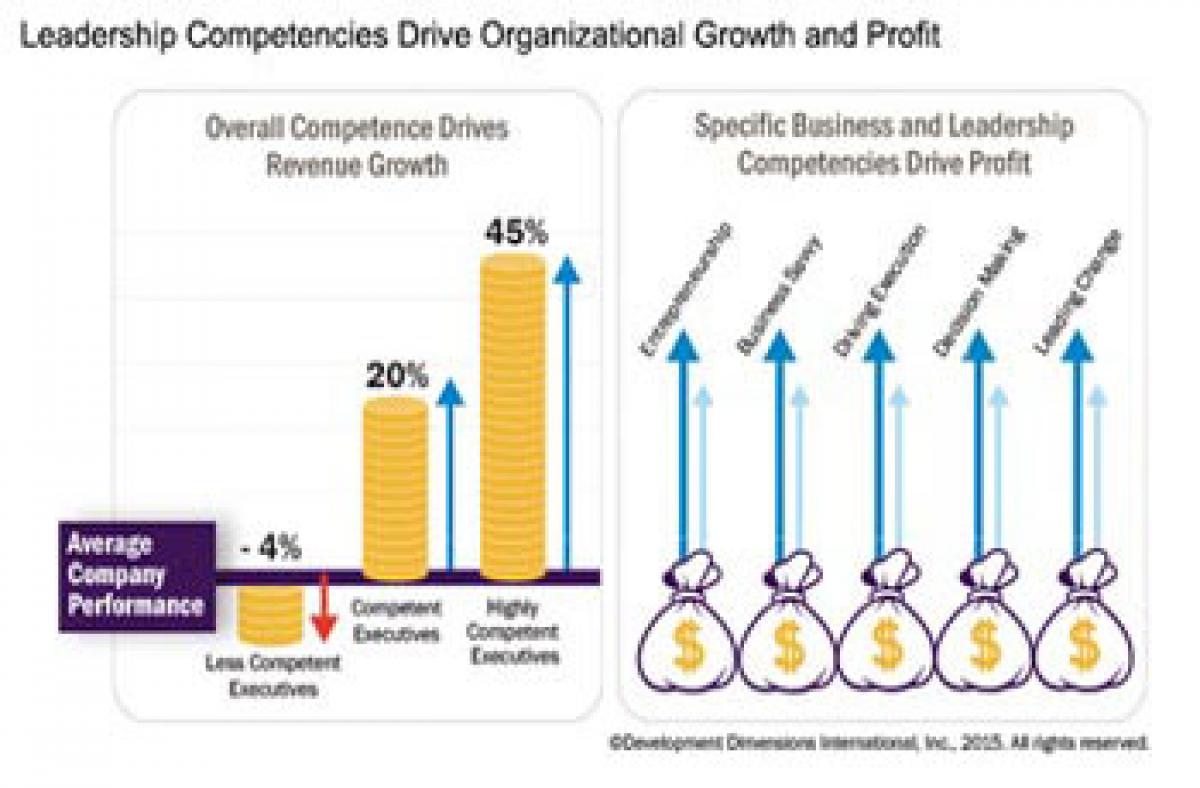DDI Identifies Leader “Money Skills” that Directly Link to Increased Profit and Revenue

New research from proprietary assessment center database redefines how leader skills, experience, personality and gender impact bottom-line business growth
New research from proprietary assessment center database redefines how leader skills, experience, personality and gender impact bottom-line business growth
Mumbai: If you want higher profit and revenue, you’ll need senior executives with the “money skills” according to a new High-Resolution Leadership report from Development Dimensions International (DDI), a pioneer in leadership assessment and development for 45 years. In a breakthrough analysis spanning nearly a decade, DDI proves with new, more compelling data that highly competent executives who demonstrate specific business and leadership skills drive more profit and revenue—by as much as 45 percent.
The 18 findings in the High-Resolution Leadership report are unprecedented because they are based on rigorous testing of real behaviors in assessment center simulations across a massive dataset of over 15,000 leaders, according to Evan Sinar, Ph.D., DDI Chief Scientist and study lead author. “Used properly, this research can revolutionize the quality of leadership around the globe and make a significant impact on business outcomes.”
The research found there were five specific skills that lead to profitable growth:
- Entrepreneurship - Crafting plans to capitalize on market opportunities;
- Business Savvy - Quickly and accurately sizing up the merits and risks in complex business scenarios;
- Driving Execution - Devising specific plans and mobilizing people to achieve strategic objectives;
- Decision Making - Making effective day-to-day judgments about short-term issues;
- Leading Change - Identifying the need for organizational change, and effectively leading people through it.
“Predicting senior executive success is fraught with error; there are rampant failures,” said Matthew J. Paese, Ph.D., DDI Vice President, and Succession Management & C-Suite Services. “This new research provides a concrete method for selecting a successful leader who can drive profitable growth. CEO succession planning should be data-driven: more like Moneyball and less like Powerball.”
To determine these money skills, DDI worked with EY to evaluate a subset of 2,077 senior-level executives with titles such as EVP, CFO and CEO from 44 large companies from the U.S., Asia, Europe and Australia. Organizations with leaders scoring higher in “business management” and “leadership of people” as described in the five competencies above, showed significantly greater net profit and return on assets. The fastest-growing, most-profitable companies in the studies had cadres of executives with wide-ranging leadership skills showing the importance of developing the money skills at lower levels.
“If you really want to set your company up for future success, you need to make sure your highest-potential talent is being channeled into learning experiences that build these money skills early,” said Richard S. Wellins, Ph.D., DDI Senior Vice President.
Double Digit Revenue Growth
DDI also worked with EY to evaluate a second subset of the data including 1,028 senior executives with titles such as EVP, CFO and CEO from 33 large corporations in the U.S. and Canada to determine the relationship between leadership competency and revenue growth. The results were compelling: when executives were highly competent at a composite of leadership skills including “business management,” “leadership of people,” “communicating a compelling vision” and “influencing stakeholders,” it was associated with 45 percent higher revenue growth between 2009 and 2014. Over the same six years, organizations whose executives were only moderately competent at these overall leadership competencies realized 20 percent growth, while the organizations with the least competent leaders realized a four percentdecline1.
These two studies suggest that organizations need senior executives with the full range of skills to generate growth, but to make that growth profitable, leader need to have laser-sharp business minds and be capable of engaging people and mobilizing them behind their ideas.
“Most businesses realize that having good leadership matters, but this research proves just how much highly-competent executives can impact financial performance,” said Paese. “In today’s business climate when stakeholders are demanding double-digit growth, why would any company make a senior-level hiring decision without knowing how the job candidates perform on these money skills? Doing so would be equivalent to organizational malpractice.”
Where Do Candidates for the C-Suite Fall Short?
To get a good look at what it takes to make it to the very top, DDI scientists turned the microscope on a group of job candidates who are like no other – those in the finalist pool for CEO2. The analysis showed that CEO candidates are intensely competitive, confident and emotionally resilient and also crave the limelight. Candidates for the top job scored up to 10 percent higher on these personality traits than all other executives.
CEO candidates excel in many areas such as having passion for results, decision making and driving execution. “We found that leaders who are successful enough to be considered for a CEO position are unlike others in the way they are able to stay laser-focused on outcomes and demand specifics on how results willbe achieved,” said Sinar. These job candidates were especially talented at instantly and accurately sizing up complex business situations and fixating on customer needs.
However, there are three areas where CEO candidates seemed to consistently fall short. The first is overlooking talent as a priority. The second biggest fail is in serving as an inspirational leader. And finally, the research showed CEO candidates often default to the short-term. “We observed that CEO candidates often make so-called strategic plans that are not very strategic at all. They may solve operational dilemmas, but few generate effective, long-range growth strategies. So, meaningful organizational change is rare,” said Sinar.
“You might call these leaders ‘do-it-yourself superheroes’ who are highly focused on the business but don’t know how to lead from the heart,” said Sinar. “Ask a CEO how to inspire a team and he or she will instinctively turn to financial projections. But the best leaders are the ones who can execute the business and engage the organization at the same time.”
How do Personality Traits Impact Leadership Performance?
Personality is a vital factor in leadership success and the High-Resolution Leadership report found leaders across all levels who were ambitious, emotionally resilient and possess high interpersonal sensitivity managed transitions up the ladder better than most. The leaders who most smoothly moved up the ranks are more likely to shed more limiting personality traits such as volatility, perfectionism, arrogance or risk aversion.
“While leadership skills can be developed, it is harder to change personality traits,” said Wellins. “You’ll want to be sure your next senior executive is not hiding some troubling tendencies before they are put into a stressful situation.” When leaders were put into high-stress situations during assessment testing such as dealing with a difficult partner or employee or handling a sensitive issue, personality traits were even more profound. For example, leaders who were argumentative and risk averse performed very poorly across the business decision leadership skills such as business savvy, entrepreneurship, establishing strategic direction and operational decision making. Under pressure, leaders with these tendencies disproportionally feared failure and became unsure and myopically focused. “When it comes to high-stakes business decisions, your judgments are as likely to be sabotaged by who you are, as by what you do,” Wellins added.
Impact of Gender on Leadership Competency
When it comes to leadership, gender shouldn’t be an issue – but it is: a business issue. Even though women make up 50 percent of the workforce, there are fewer female leaders in the global workforce.Only five percent of CEOs are women and only twenty-four percent of high-potential leaders are women in the U.S.3 Is this because women do not have the skills to be good leaders?
While more men were part of the candidate database in the research, the findings show no significant difference between men and women regarding leadership skills or ability to handle management and business challenges. “While the glass ceiling for women hasn’t shattered yet, our research shows that both genders can and should be good leaders at every level in the organization,” Wellins said.
In terms of personality traits, there were some interesting differences between men and women leaders. Men were more impulsive and inquisitive than women while women were more interpersonally sensitive. “The bottom line is that a work culture that makes all types of diversity a key priority is a must,” Wellins concluded.
1) “Overall Competence Drives Revenue Growth” results are based on the revenue growth rate of companies from 2009 to 2014 compared to the growth rate of their respective industries over the same years. Executive competency scores were aggregated for each company and growth rates werecompared between “less competent,” “competent,” and “highly competent” groups.
“Specific Business and Leadership Competencies Drive Profit” results are based on a four-year average of Net Profit Margin (net income divided by revenue) compared to industry competitors, including and extending beyond the year when leaders were assessed. The five competencies shown were the most consistent predictors (as a set) of this four-year profit outcome.
2) The research analyzed the real behaviors of 243 CEO finalists representing 48 companies as they participated in one- or two-day simulation tests and benchmarked them against the entire database of over 15,000 job candidates.
3) According to research from DDI and The Conference Board, titled The Global Leadership Forecast (GLF) 2014 | 2015, Ready-Now Leaders: Meeting Tomorrow’s Business Challenges.
About DDI’s High-Resolution Leadership
DDI’s new High-Resolution Leadershipreport provides both a telescopic and microscopic lens on what drives great leadership performance, and, ultimately, business performance. This report is unprecedented for a combination of reasons. First, the data is based on real behaviors observed in DDI’s assessment centers during“day in a life” leadership simulations. Second, the research represents more than a decade of details from more than 15,000 candidates being considered for leadership roles ranging from frontline to the C-suite, representing over 300 organizations across 20 industries in 18 countries. The 18 findings in the High-Resolution Leadership report draw a very clear picture of what makes a great leader, what leadership skills predict better business metrics, and which personal attributes and skill patterns influence leader success as they move higher.
About Development Dimensions International
Founded in 1970, DDI is a global talent management consultancy that helps companies transform the way they hire, promote and develop their leaders. DDI’s expertise includes identifying and developing frontline leaders to executives. Clients include half of the Fortune 500 and multinationals doing business across a vast array of industries from Berlin to Bangalore and everywhere in between. We serve clients from 42 DDI-owned or closely affiliated offices.
















